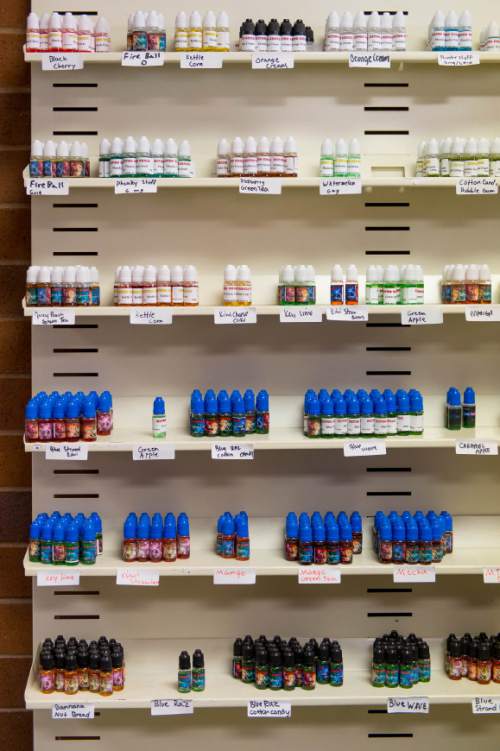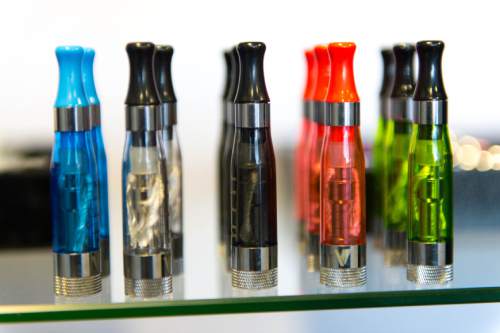This is an archived article that was published on sltrib.com in 2015, and information in the article may be outdated. It is provided only for personal research purposes and may not be reprinted.
New regulations on electronic cigarettes scheduled to take effect next year could effectively ban as much as 80 percent of the nicotine oils sold in the state, an industry representative said Monday, prompting Utah lawmakers to ask the Health Department to rethink the proposed rule.
The state is considering requiring all of the nicotine-containing oils used in e-cigarettes to carry a warning label stating, "Nicotine is addictive and poisonous. Keep away from children and pets."
But Tad Jensen, president of the Utah Smoke Free Association and owner of a shop that sells e-cigarettes, told lawmakers that between 70 percent and 80 percent of the liquids sold in the state are from outside of Utah or from overseas, and the producers he had contacted said they were unwilling to spend the money to comply with Utah's labeling requirement.
Utah legislators on the Administrative Rules Review Committee seemed sympathetic to the concerns.
"This rule is not ready for prime time," said Sen. Gene Davis, D-Salt Lake City.
Sen. Mark Madsen, R-Saratoga Springs, said losing the liquids would harm the businesses that sell e-cigarettes and questioned if there were less onerous ways to achieve the goal.
"I'm not hearing any openness to a solution or flexibility that gets us to the objective," Madsen said, "without having these tremendous collateral consequences."
Robert Rolfs, deputy director of the Health Department, said it was unclear "if the tremendous collateral consequences will occur."
He said other industry representatives who were on the committee that crafted the proposed rule didn't object to the labeling requirement. And, he said, manufacturers aren't required to comply with the rule until July, which would give the industry time to adjust or give the department a chance to revisit the rule if it became a problem.
Janae Duncan, manager of the Health Department's Tobacco Prevention and Control Program, said there would certainly need to be a change in the marketing that would have to occur once the rule took effect. But local makers of the liquid who were consulted said they were willing to comply with the warning label.
The label is intended to warn consumers that the flavored liquids could be dangerous or even deadly children or pets who consume them. The Health Department has reported that there were 131 calls to the Utah Poison Control Center last year related to e-cigarettes.
Under the proposed rule, the warning would have to take up 30 percent of the largest panel on the bottle of liquid and be written in all-capital letters in one of three fonts.
The proposed rule also limits the concentrations of nicotine that can be in the liquids, requires that the liquids be sealed to prevent tampering and mandates that the packaging have childproof caps. It also requires manufacturers to comply with federal safety guidelines and to maintain records that state regulators could inspect.
The Health Department issued the proposed rule in mid-October and accepted comments on the rule until the middle of November. Rolfs said about 40 percent of the comments supported the proposed rule, 30 percent were mixed and 30 percent opposed the new standards.
Lawmakers said they anticipate looking into the e-cigarette regulation further before manufacturers are required to comply with the rules in July.
Twitter: @RobertGehrke







